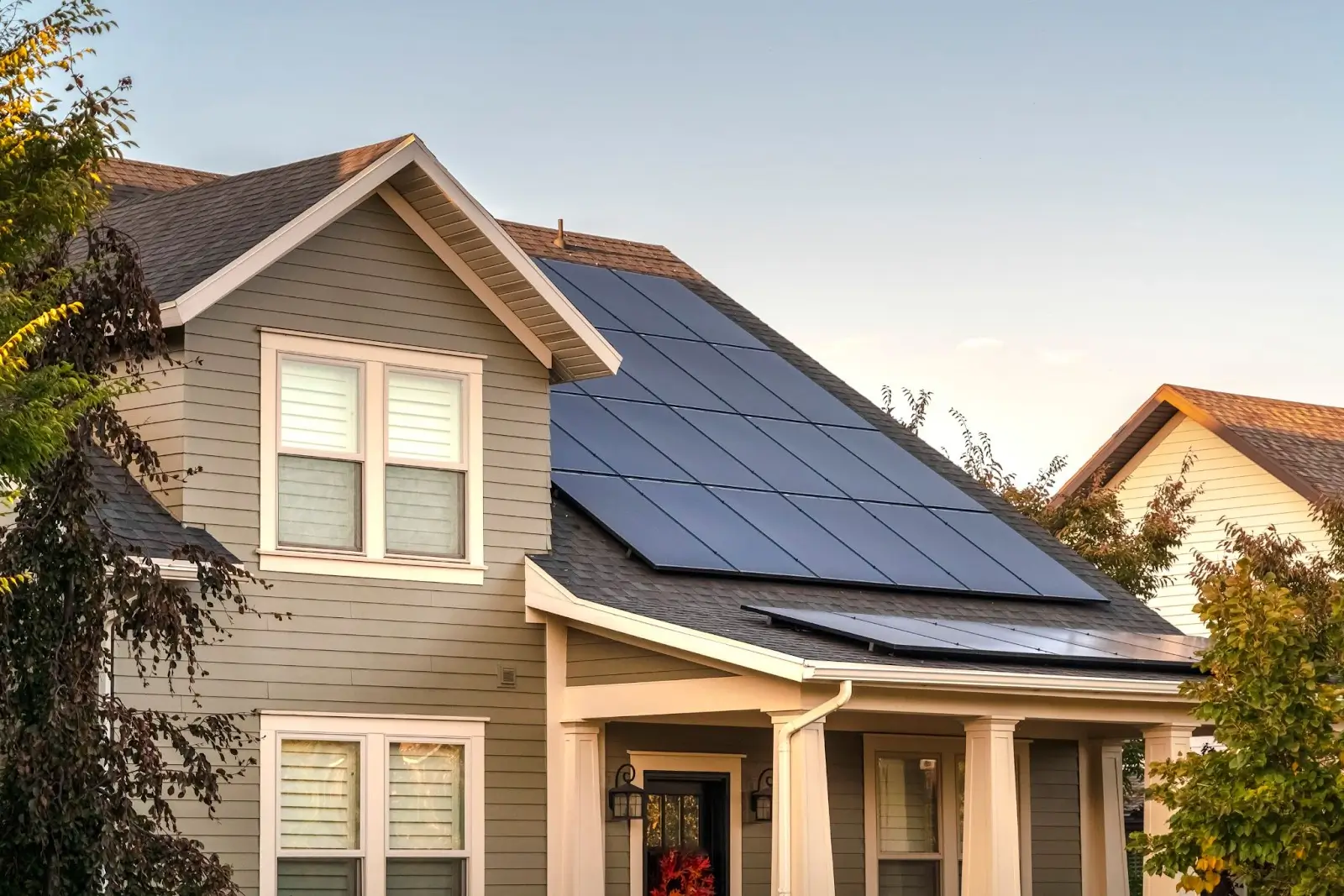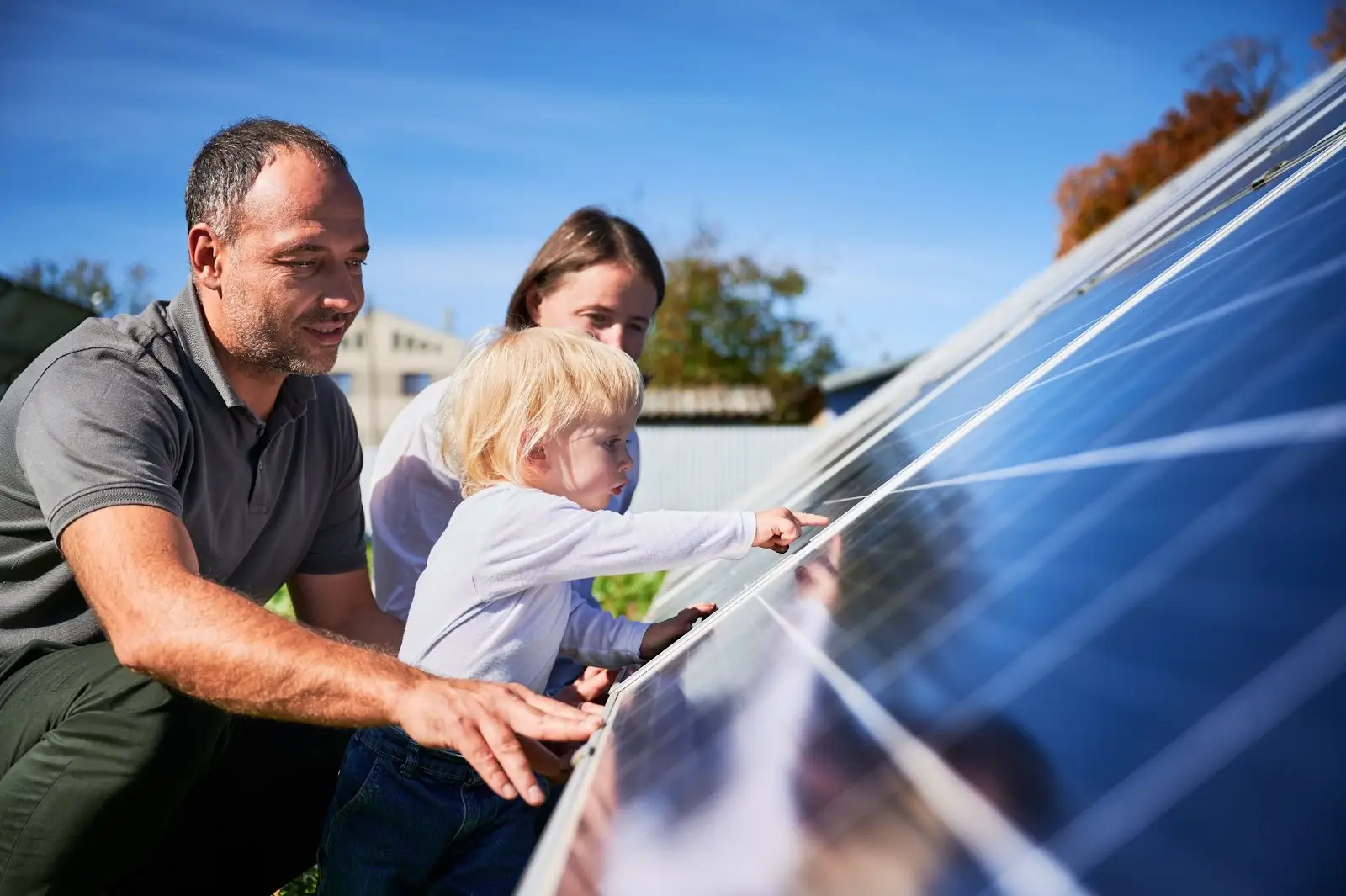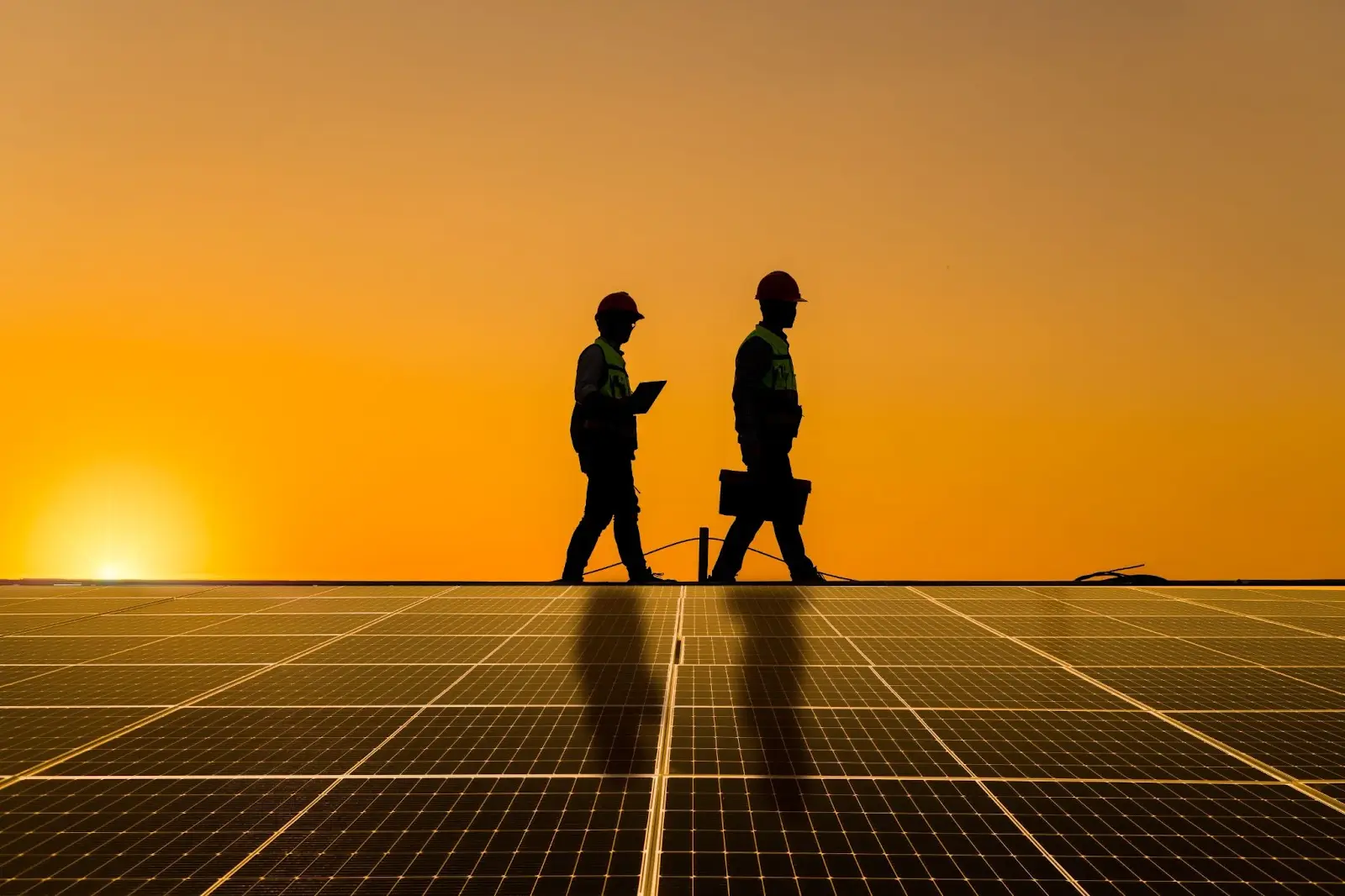Considering solar panel installation but concerned about the upfront costs? Solar loans provide a practical solution to finance your renewable energy system and make the transition to clean, sustainable power a reality.
In this article, we will explore the world of solar loans, including solar panel loans, loans for solar, solar panel financing, solar financing, and solar loan interest rates. We’ll cover the factors to consider, types of loans available, pros and cons, and how to get started with Construct Sun’s residential solar panel installation service, serving Reno, Nevada, and Raleigh, North Carolina.
What is a solar loan?
A solar loan is a financing option specifically designed to help homeowners invest in solar energy systems. It allows you to borrow the necessary funds to cover the upfront cost of solar panel installation and repay the loan over time. By leveraging solar loans, homeowners can enjoy the benefits of solar energy without the hefty upfront expenses.

Factors To Consider When Financing Your Purchase with a Solar Loan
When it comes to financing your solar panel installation, considering the right options is essential. Here are factors you need to consider when you’re looking to get a solar loan for your solar panel installation:
Owning A Solar Energy System
Investing in a solar energy system enables you to generate your own clean, renewable energy. By harnessing the power of the sun, you can reduce your reliance on traditional energy sources and contribute to a more sustainable future.
Higher Upfront Installation Cost
While the installation cost of solar panels may seem high at first, the long-term benefits outweigh the initial investment. Solar loans allow you to spread out the cost over time, making it more affordable for homeowners.
Solar Incentives
Federal, state, and local incentives make solar panel installation even more appealing. These incentives can include tax credits, rebates, and performance-based incentives, all of which can significantly reduce the overall cost of your solar energy system.
Reduce Income Taxes
With certain solar financing options, you may be eligible for tax benefits. These benefits can come in the form of federal investment tax credits (ITC) and state-level incentives, allowing you to save money on your income taxes while investing in renewable energy.
Increase Home Value
Studies have shown that homes equipped with solar energy systems have higher resale values. A solar panel installation not only reduces energy costs but also increases the overall value of your property, making it an excellent long-term investment.
Save Money
By producing your own electricity, you can reduce or even eliminate your monthly utility bills. Over time, the savings from lower energy bills can offset the cost of the solar loan, resulting in significant financial benefits for homeowners.
What are the types of solar energy loans?
When considering solar energy loans, you have two main options: secured solar loans and unsecured solar loans. Each type has its own advantages and considerations.
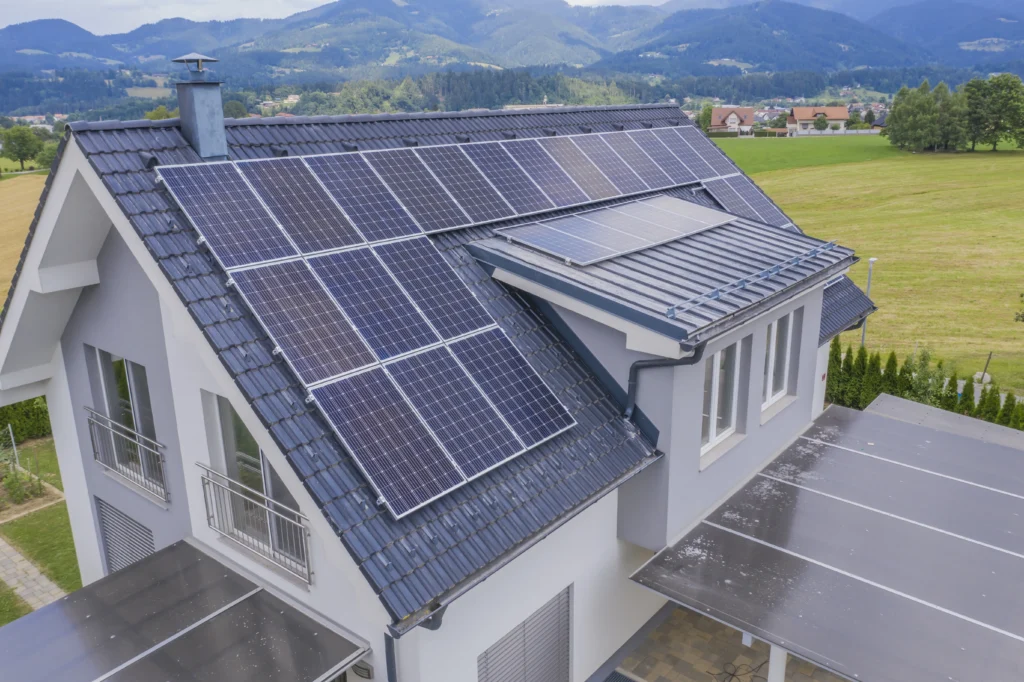
Secured Solar Loans
Secured solar loans are backed by collateral, such as your home or the solar energy system itself. These loans typically offer lower interest rates and longer repayment terms. By providing collateral, you reduce the risk for the lender, which translates into more favorable terms for you as the borrower. However, it’s important to note that if you default on the loan, the collateral may be at risk.
Unsecured Solar Loans
Unsecured solar loans, on the other hand, do not require collateral. This can be a preferred option for homeowners who do not want to use their property as collateral or who may not have sufficient equity. However, unsecured solar loans often come with higher interest rates and shorter repayment terms compared to secured loans. The absence of collateral means a higher level of risk for the lender, which is reflected in the loan terms.
When choosing between secured and unsecured solar loans, consider your financial situation, creditworthiness, and willingness to provide collateral. Assessing the trade-offs and understanding the potential risks will help you make an informed decision that aligns with your needs and preferences.
Pros And Cons Of Loans For Solar Panels
Solar loans offer numerous advantages. However, it’s also important to be aware of potential drawbacks. Here are the pros and cons of solar panels:
Pros
Borrowing means lower out-of-pocket expenses
Solar loans allow homeowners to spread out the cost of solar panel installation, reducing the burden of upfront expenses. This makes transitioning to solar energy more affordable and accessible.
Borrowers may be eligible for tax benefits
Depending on the loan and location, homeowners may qualify for tax credits and incentives. These financial benefits provide additional savings and can help offset the cost of the solar energy system.
Solar-powered systems can generate energy and income
Excess energy produced by your solar panels can be fed back into the grid. Through net metering programs, you can earn credits or cash for the energy you contribute, potentially turning your solar panels into a source of income.
Solar energy systems boost property value
Homes equipped with solar panels have higher market value and are more attractive to potential buyers. By investing in solar, you not only benefit from energy savings but also enhance the overall value of your property.
Do your part for the environment
By switching to solar energy, you contribute to reducing greenhouse gas emissions and promoting a cleaner, greener future. Solar panels offer a sustainable energy solution that aligns with environmental consciousness.
Cons
Your clean energy mileage may vary
The effectiveness of solar panels can be influenced by factors such as location, shading, and weather conditions. These factors may affect the actual energy savings and the overall performance of the solar system.
You may not save money right away
While solar panels can save you money over the long term, it’s important to note that the return on investment may take several years to realize. The upfront investment needs time to be recouped through energy savings.
Interest puts a dent in your bottom line
Solar loans come with interest charges, which increase the overall cost of the system. However, the financial benefits of solar energy, such as energy savings and increased property value, typically outweigh the interest paid.
How To Get A Solar Loan
From getting a cost estimate to securing funding, this guide will assist you in taking the necessary steps to finance your solar panel installation with confidence. Read on to learn how to get a solar loan and bring clean energy to your home.
Get a cost estimate
Contact a reputable solar installation company like Construct Sun to assess your home’s solar potential and provide a detailed cost estimate for the installation.
Calculate solar loan payments
Use online calculators or consult with your lender to determine the monthly loan payments based on the loan amount, interest rate, and term. This step will provide you with a clear understanding of the financial commitment involved.
Check your rate
Research different lenders and compare their interest rates, terms, and customer reviews to find the best fit for your needs. Consider factors such as loan terms, repayment options, and the lender’s reputation to make an informed decision.
Apply
Once you’ve selected a lender, submit your loan application, providing the necessary documentation and information. This may include proof of income, credit history, and details about your solar installation plans.
Get funded
After your loan application is approved, the lender will provide the funds necessary for your solar panel installation. These funds will cover the upfront costs, allowing you to proceed with the installation process.
How to Compare Solar Loans
To make an informed decision, it’s essential to consider key factors that can impact the overall cost and affordability of the loan.
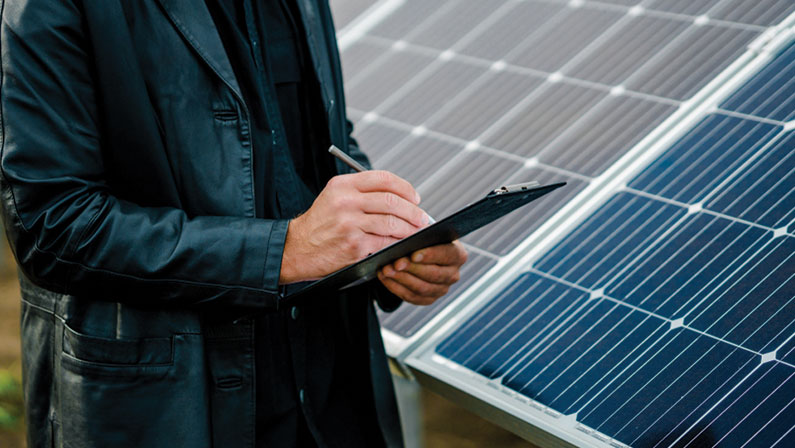
Annual Percentage Rate (APR)
The APR reflects the true cost of the loan, including the interest rate and any additional fees. A lower APR indicates a more cost-effective loan, saving you money over the loan term.
Monthly payment
Assess whether the monthly payment fits within your budget and financial goals. Consider the loan term and interest rate to determine a monthly payment that is affordable and manageable for you.
Fees
Pay attention to any origination fees or prepayment penalties associated with the loan. These fees can impact the total cost of the loan and should be factored into your decision-making process.
Term
Determine the loan term that works best for you, balancing the monthly payment amount and the total interest paid over time. A longer-term may result in lower monthly payments but could lead to higher overall interest costs.
Are There Other Solar Panel Financing Options?
In addition to solar loans, there are several other financing options to consider:
Solar Company Financing
Some solar installation companies offer their own financing options, allowing you to finance the system directly through them.
Personal Loans
Personal loans from banks or credit unions can be used to finance solar panel installation. These loans are unsecured and typically have higher interest rates.
Energy-Efficient Mortgages (EEMs)
EEMs are specialized mortgages that incorporate the cost of energy-efficient upgrades, including solar panels, into the home loan.
Home Equity Loans And HELOCs
Home equity loans and home equity lines of credit (HELOCs) allow homeowners to leverage the equity in their property to finance solar panel installation.
Property Assessed Clean Energy (PACE) Loans
PACE loans are repaid through an assessment on the property tax bill and are available in certain areas. They can be a useful option for homeowners who may not qualify for traditional loans.
Solar Loan FAQs
In this section, we will address frequently asked questions (FAQs) related to solar loans.
Is it worth getting a loan for solar panels?
Yes, solar loans provide an accessible financing option that allows homeowners to reap the long-term benefits of solar energy while saving money on utility bills. With favorable terms and the potential for energy savings, solar loans offer a worthwhile investment in a sustainable future.
Do banks offer loans for solar?
Yes, many banks and credit unions include solar loans as part of their loan product offerings. It’s worth exploring different financial institutions to find competitive loan options tailored to your needs.
What is a good interest rate for a solar loan?
Interest rates for solar loans can vary depending on factors such as credit score, loan term, and the type of loan. However, competitive interest rates typically range from 2% to 8%. It’s advisable to compare rates from different lenders to secure the most favorable terms.
How long is a typical solar loan?
The term of a solar loan can range from 5 to 25 years, depending on the lender and the borrower’s preferences. It’s essential to consider your financial goals and the desired repayment period when choosing a loan term.
What is the best way to finance solar?
The best financing option depends on your financial situation and goals. While solar loans offer a popular and accessible method to finance solar panel installation, it’s important to compare and explore other options to find the best fit for you. Consider factors such as interest rates, terms, available incentives, and your long-term financial strategy.
How are solar loans structured?
Solar loans are typically structured as installment loans, where borrowers make monthly payments over a specified term until the loan is fully repaid. This structured repayment schedule allows homeowners to manage their loan obligations while enjoying the benefits of solar energy.
Whether To Apply For A Solar Energy System Loan Is Up To You
Deciding whether to apply for a solar energy system loan is a personal choice that depends on your priorities and financial situation. However, it’s important to recognize the significant benefits that solar panel installation can bring, including reduced energy bills, increased home value, and environmental consciousness.
While the initial costs of solar panel installation may seem high, solar loans offer an attractive opportunity to overcome the cost barrier and embrace renewable energy. With the availability of financing options, such as those offered by Construct Sun, a reputable solar installation company serving Reno, Nevada, and Raleigh, North Carolina, you can make the switch to solar energy with ease. Their guidance and expertise ensure a seamless installation experience and long-term savings on your energy bills.
By choosing residential solar panel installation through a solar loan, you not only contribute to a cleaner and more sustainable future but also make a wise investment that offers financial benefits and increased home value.
Ready to switch to solar? Embrace the power of solar energy and join the growing community of homeowners who are making a positive impact on the environment and their financial future. Contact Construct Sun today to explore their residential solar panel installation service and embark on your journey towards a greener and more energy-efficient home.
